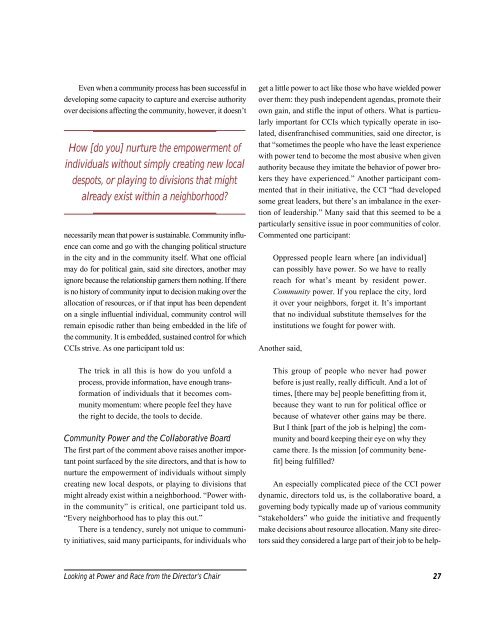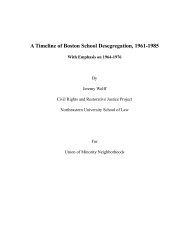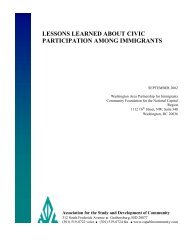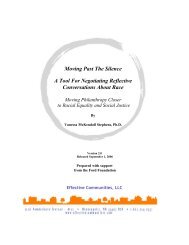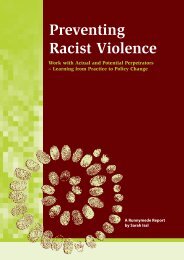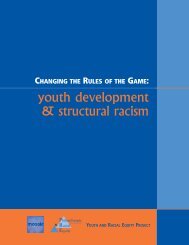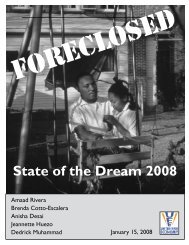Core Issues in Comprehensive Community-Building Initiatives ...
Core Issues in Comprehensive Community-Building Initiatives ...
Core Issues in Comprehensive Community-Building Initiatives ...
Create successful ePaper yourself
Turn your PDF publications into a flip-book with our unique Google optimized e-Paper software.
Even when a community process has been successful <strong>in</strong><br />
develop<strong>in</strong>g some capacity to capture and exercise authority<br />
over decisions affect<strong>in</strong>g the community, however, it doesn’t<br />
How [do you] nurture the empowerment of<br />
<strong>in</strong>dividuals without simply creat<strong>in</strong>g new local<br />
despots, or play<strong>in</strong>g to divisions that might<br />
already exist with<strong>in</strong> a neighborhood?<br />
necessarily mean that power is susta<strong>in</strong>able. <strong>Community</strong> <strong>in</strong>fluence<br />
can come and go with the chang<strong>in</strong>g political structure<br />
<strong>in</strong> the city and <strong>in</strong> the community itself. What one official<br />
may do for political ga<strong>in</strong>, said site directors, another may<br />
ignore because the relationship garners them noth<strong>in</strong>g. If there<br />
is no history of community <strong>in</strong>put to decision mak<strong>in</strong>g over the<br />
allocation of resources, or if that <strong>in</strong>put has been dependent<br />
on a s<strong>in</strong>gle <strong>in</strong>fluential <strong>in</strong>dividual, community control will<br />
rema<strong>in</strong> episodic rather than be<strong>in</strong>g embedded <strong>in</strong> the life of<br />
the community. It is embedded, susta<strong>in</strong>ed control for which<br />
CCIs strive. As one participant told us:<br />
The trick <strong>in</strong> all this is how do you unfold a<br />
process, provide <strong>in</strong>formation, have enough transformation<br />
of <strong>in</strong>dividuals that it becomes community<br />
momentum: where people feel they have<br />
the right to decide, the tools to decide.<br />
<strong>Community</strong> Power and the Collaborative Board<br />
The first part of the comment above raises another important<br />
po<strong>in</strong>t surfaced by the site directors, and that is how to<br />
nurture the empowerment of <strong>in</strong>dividuals without simply<br />
creat<strong>in</strong>g new local despots, or play<strong>in</strong>g to divisions that<br />
might already exist with<strong>in</strong> a neighborhood. “Power with<strong>in</strong><br />
the community” is critical, one participant told us.<br />
“Every neighborhood has to play this out.”<br />
There is a tendency, surely not unique to community<br />
<strong>in</strong>itiatives, said many participants, for <strong>in</strong>dividuals who<br />
get a little power to act like those who have wielded power<br />
over them: they push <strong>in</strong>dependent agendas, promote their<br />
own ga<strong>in</strong>, and stifle the <strong>in</strong>put of others. What is particularly<br />
important for CCIs which typically operate <strong>in</strong> isolated,<br />
disenfranchised communities, said one director, is<br />
that “sometimes the people who have the least experience<br />
with power tend to become the most abusive when given<br />
authority because they imitate the behavior of power brokers<br />
they have experienced.” Another participant commented<br />
that <strong>in</strong> their <strong>in</strong>itiative, the CCI “had developed<br />
some great leaders, but there’s an imbalance <strong>in</strong> the exertion<br />
of leadership.” Many said that this seemed to be a<br />
particularly sensitive issue <strong>in</strong> poor communities of color.<br />
Commented one participant:<br />
Oppressed people learn where [an <strong>in</strong>dividual]<br />
can possibly have power. So we have to really<br />
reach for what’s meant by resident power.<br />
<strong>Community</strong> power. If you replace the city, lord<br />
it over your neighbors, forget it. It’s important<br />
that no <strong>in</strong>dividual substitute themselves for the<br />
<strong>in</strong>stitutions we fought for power with.<br />
Another said,<br />
This group of people who never had power<br />
before is just really, really difficult. And a lot of<br />
times, [there may be] people benefitt<strong>in</strong>g from it,<br />
because they want to run for political office or<br />
because of whatever other ga<strong>in</strong>s may be there.<br />
But I th<strong>in</strong>k [part of the job is help<strong>in</strong>g] the community<br />
and board keep<strong>in</strong>g their eye on why they<br />
came there. Is the mission [of community benefit]<br />
be<strong>in</strong>g fulfilled?<br />
An especially complicated piece of the CCI power<br />
dynamic, directors told us, is the collaborative board, a<br />
govern<strong>in</strong>g body typically made up of various community<br />
“stakeholders” who guide the <strong>in</strong>itiative and frequently<br />
make decisions about resource allocation. Many site directors<br />
said they considered a large part of their job to be help-<br />
Look<strong>in</strong>g at Power and Race from the Director’s Chair 27


